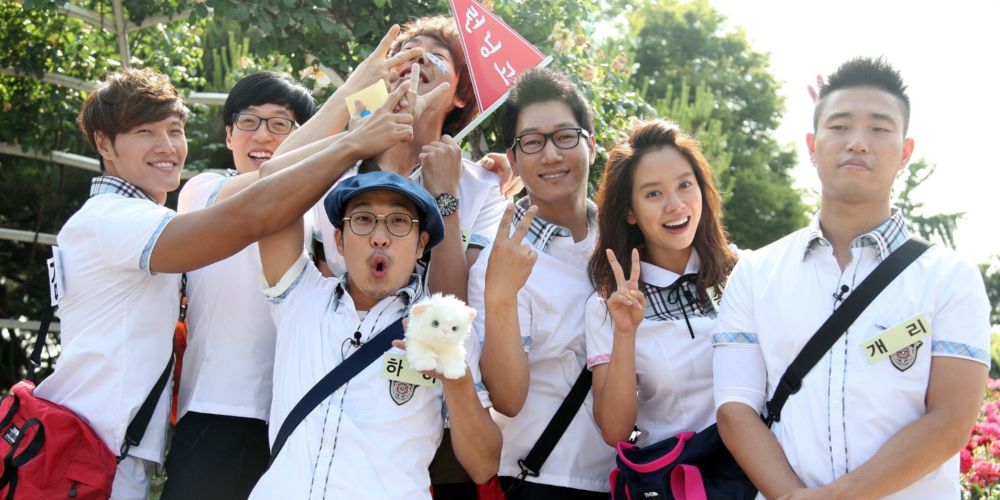A few years ago, a show on Netflix caught my eye: Busted!, a South Korean mystery-comedy semi-scripted series about a group of contestants who play private detectives and are given cases to solve every episode.
While it's a fun idea, I lost interest around three episodes in. But it felt unique and it got me thinking:
Are there any other TV series similar to this one, perhaps with a different premise but similar focus on improvised lines and comedic cast chemistry?
Turns out, there's an entire genre of shows in this line, and it's been around for many decades. They're called Korean variety shows, and they're insanely addicting when executed well.
What Are Korean Variety Shows?
The concept of a Korean variety show is hard to nail down.
It is NOT a sketch show a la Saturday Night Live that jumps between different types of entertainment.
The closest American analogue to the Korean variety show would be reality competitions, but it's not a perfect one-to-one because not all Korean variety shows involve competitions—and the ones that do aren't primarily about the competitions.
American reality shows like MasterChef and The Amazing Race have different contestants every season, in an elimination format, with the main draw being who comes out on top in the finale.
On the other hand, Korean variety shows have a fixed cast that drives the series without switching up every season, and the main draw is seeing authentic cast interactions and watching how the cast makes it through each episode.
Some Korean variety shows also bring on celebrity guests on some episodes, which can double as a kind of talk show while the guests partake in the same activities as the main cast.
Still sounds a bit nebulous, doesn't it?
The best way to grasp the concept of Korean variety shows is to watch one yourself. But assuming you don't have the time for that, let's look at a few examples of the most popular Korean variety shows that have global fan bases.
Notable Examples of Korean Variety Shows
Running Man
Running Man may just be the most internationally recognized Korean variety show of all time, and for good reason:
The cast of 7 (later expanded to a cast of 8) have amazing comedic chemistry with each other. The challenges in each episode are cleverly designed for dramatic cast interactions. And the penalties for losing aren't just slaps on the wrist, which raises the stakes and tension.
Running Man doesn't really have a "format"—the only premise that carries over between episodes is that the cast are presented with unique (and often hilarious) challenges to overcome.
Knowing Bros
Also known as Men on a Mission, Knowing Bros is a mixture between talk show and games show. It floundered in its early running until it struck gold with a revamped format in episode 17:
The main cast of 7 are "students" at "Brother School" and each episode's celebrity guest is a "transfer student" who's trying to enroll at Brother School by showing how impressive they are. It's basically a stylized talk show with games.
Each episode is divided into three segments:
- Entrance Application (each guest fills out an "application" before appearing on the show, which contains personal questions that are discussed during this segment)
- Guess About Me (the guest presents their own personal questions and the cast members need to guess the answer)
- A rotating third segment that changes each episode
We Got Married
We Got Married pairs two single celebrities, who pretend to be a married couple and face all kinds of challenges together—the kinds of challenges a real married couple might face.
Multiple couple pairings air concurrently, and new couples are added as older ones drop off.
One of the most interesting aspects of We Got Married is how much of a celebrity's real personality gets unveiled over the course of their time on the show.
Could you imagine this kind of show airing in America? I can't think of an American celebrity who'd willingly sign on.
The Addicting Spice in Variety Shows
If Korean variety shows could be summed up in a single word, it would have to be authenticity.
Obviously, everyone on a Korean variety show—both cast and guest—knows that they're on a TV show and is capable of putting on a facade for the public.
But even so, there's a degree of vulnerability and openness that you just won't see with American celebrities on American talk shows. They actually have real conversations.
And it's this authenticity (both in cast members and celebrity guests) that keeps viewers like me hooked to the screen.
Sure, the games are fun and the banter is funny, but it's the feeling of being right there with these people—almost like you're in the same room with them, like they could even be your friends—that elevates the genre far above normal reality TV.
If you're skeptical and want a taste of what these Korean variety shows are all about, you can find clips (sometimes even full episodes) on YouTube.
Just search for shows like "Running Man," "Knowing Bros," "We Got Married," "1 Day 2 Nights," "Family Outing," "Infinite Challenge," "Weekly Idol," or any of the dozens of other heart-winning Korean variety shows out there!

